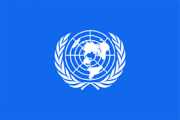Mr. Chairman,
As this is my first intervention in the Second Committee for this 67th Session, allow me to congratulate you on your election to Chair this Committee and to assure you and the members of the Bureau of my delegation’s full support in your endeavours.
Let me express my delegation’s appreciation for the reports which the Secretary-General has prepared to guide our deliberations on agenda item 25 – Operational activities for development, and thank Deputy Secretary-General, Mr. Jan Eliasson and Director of the UN Office for South-South Cooperation, Mr. Yiping Zhou for having joined us this morning to engage in an exchange of views on the report.
Jamaica aligns itself with the statements which were delivered by the distinguished representative of Algeria in it capacity as Chair of the Group of 77 & China, the representative of Antigua and Barbuda on behalf of the Caribbean Community (CARICOM) and the Ambassador of Chile on behalf of the Community of Latin American and Caribbean States (CELAC).
Mr. Chairman,
The role of the United Nations development system in advancing the global development agenda is one to which Jamaica attaches great importance. The Funds, Programmes and Agencies of the United Nations are among the main mechanisms through which the norms and principles which we agree upon through our deliberations here in the United Nations are given practical, tangible effect in our countries.
The support of the United Nations is particularly relevant as we pursue our development goals against the backdrop of the many socio-economic challenges with which we have to contend and which have become particularly acute in the last five years. Such challenges have included the global financial crisis whose negative effects continue to reverberate through our economies, rising energy costs and recurring instances of food insecurity.
We wish to underscore the importance of the work of the UN system which, despite its limitations, serves to bolster the efforts of the Jamaican Government, and those of other Governments in Latin America and the Caribbean in advancing their domestic development agendas in the face of great fiscal constraints and in the face of the very real challenges of poverty and persistent inequality.
Given this, it is important that the international community take steps to strengthen the effectiveness of the UN’s operational activities for development, including through the provision of a level of financial resources which will allow for the implementation of programmes which address the development needs of the poorest and most vulnerable.
The United Nations country team in Jamaica provides invaluable support work in a range of areas including sustainable development, social empowerment and equity, violence prevention, human rights advocacy, disaster risk reduction and in the ongoing process of developing a national policy and plan of action on international migration and development.
The team has worked closely with stakeholders from the Planning Institute of Jamaica and various line Ministries and agencies to align the United Nations Development Assistance Framework with the country’s national development priorities as set out in its national development plan “Vision 2030”. We believe that this process of open consultations and collaboration to ensure that the UN’s activities are in keeping with the country’s priorities constitutes an essential component of the partnership between developing countries and the United Nations system.
Mr. Chairman,
During this session we will engage in intense negotiations on the resolution on the quadrennial comprehensive policy review (QCPR) of the United Nations’ operational activities for development. This is a very important undertaking which will lay the groundwork for the development activities of the UN’s Funds and Programmes for the next four years.
The QCPR, in providing the space for the member States of the United Nations to review the efficiency, effectiveness, coherence and impact of the UN’s operational activities, provides an invaluable opportunity for us to ensure that the UN is provided with clear policy guidance and financial and technical support which will enable it to fulfill its mandate of supporting developing countries in the achievement of their national development priorities.
In this connection, my delegation wishes to underscore the importance of the provision of predictable, stable, long-term funding for the UN’s operational activities, with a particular emphasis on the need to increase core funding. In recent years there has been a noticeable decline in core funding in relation to non-core funding, a development which, in our estimation, limits the UN development system’s ability to effectively respond to the priorities of developing countries.
We maintain that steps must be taken to remedy the growing imbalance between core and non-core funding with a view to ensuring that the universality, voluntary and grant nature of the UN’s operational activities for development are not compromised. It is also important that their multilateral nature be preserved.
Mr. Chairman,
As a Middle Income Country (MIC), Jamaica wishes to reaffirm the importance of the continued presence of the UN system on the ground in countries which fall in this category.
Indeed, in keeping with the appeal which was made by our Prime Minister during her presentation to the UNGA a few weeks ago, my delegation urges that MICs not be pushed to the margins of the development agenda, nor be put on the fringe of the development assistance provided by the international community.
Mr. Chairman,
We have followed with interest the progress which has been made in the implementation of the Delivering as One approach in a number of countries, and have taken note of the successes which have been achieved in that regard. While we support the effort to find ways of improving the delivery of the UN’s services on the ground in our countries, we would advocate caution on the part of those advocating the adoption of Delivering as One as the main mechanism for conducting the UN’s development activities in all countries. We must adhere to the oft-repeated caveat that one size does not fit all in the development and implementation of development programmes. The focus should be on determining the best model of engagement for the particular circumstances in a given country.
Mr. Chairman,
Jamaica has long supported South-South cooperation as a core element in development cooperation and as an essential element in the process of consolidating solidarity among developing countries. We welcome the growing range of development cooperation activities in which we engage within the context of South-South and triangular cooperation and acknowledge their contribution to our efforts to achieve the internationally agreed development goals, including the Millennium Development Goals. However, we do so with the full understanding such cooperation is complementary to rather than a substitute for traditional development cooperation.
We welcome the decision which was taken by the recent Seventeenth Session of the High Level Committee on South-South Cooperation to transform the Special Unit for South-South Cooperation into the United Nations Office for South-South Cooperation and look forward to supporting the work of the Office.
I thank you Mr. Chairman.


